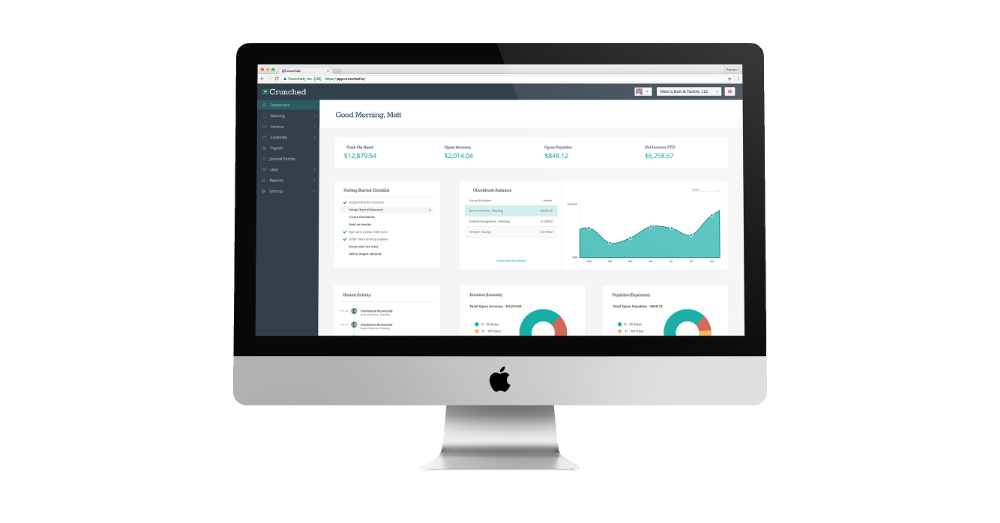How To Choose The Right Cloud Accounting Software
By Matt Reims
Healthy businesses succeed and thrive when their finances and bookkeeping are well-managed and organized. It’s not enough to just generate strong revenue. Small business owners and bookkeepers know it’s important to have steady funds coming in, but how much is going out? How healthy is your cash flow? How much can you budget toward payroll, marketing, or expanding your workforce? To help answer and stay on top of these questions, more and more are using cloud accounting software. Automating the bookkeeping process can make finances faster and easier to manage, and will help ensure accuracy.
When searching for “small business accounting software” or “cloud accounting software,” it can be a bit stressful when trying to make the choice that’s right for your business. Fear not. The following guidelines map out the features and benefits that are most important for helping you manage your finances.
Not everyone’s bookkeeping needs are created equal. The bigger the business, the more functionality it may need. Regardless of whether you’re a one-person start-up or are about to celebrate the hiring of your 100th employee, there are basic qualities you’ll need in your bookkeeping software, as follows:
Ease of Use
One of the most significant benefits of cloud accounting software is that the right platforms make the bookkeeping process simpler. Look for a solution with easy-to-navigate workflow, where primary tasks are readily accessible, such as managing your checkbook, invoicing customers, paying expenses, viewing reports, etc. The terminology and instructions within the system should be clearly labeled and defined. You should also have support options, such as live chat, online tutorials, and customer forums to help answer any questions that come up.
Ease of Access
This is where the “cloud” in cloud accounting software comes in. There are still off-the-shelf, traditional software packages available, but the main benefit of the cloud is that it allows you to access your bookkeeping on numerous devices at any time.
Some small businesses operate with multiple divisions or even separate business names. If you’re an owner or bookkeeper for this type of business, look for an accounting software solution that allows you to set up and access each division or business as a user and not as a separate business. This way you can have multiple businesses or divisions within the system that can be managed under the same account. This will make logging in simple and allow your multiple businesses to share files and access the same tools.
Functionality
There are plenty of cloud accounting software solutions that attempt to make bookkeeping easier, but at the end of the day, some can actually make things more difficult. Your accounting solution should function intuitively by taking into account the most common bookkeeping errors that can be so easy to make. To help avoid these errors and make the process function more smoothly, look for a solution with deactivation controls for certain items such as checkbooks, accounts, vendors, customers, sales items, etc. And look for built-in audit controls designed to prevent the deletion of historical information.
Advanced Automation Features
Automation features are key to a system designed to help make the financial management of your small business faster and easier. Some of the most advanced automation features include:
- Automated customer payment applications that allow customers access to their own portal, where they can log in and pay open invoices.
- Queue transactions for on-time processing.
- The ability for users to create memorized transactions and set up recurring schedules.
Security
If you’re new to cloud accounting software, then you may be thinking about security. After all, your financial data and assets are the lifeline of your business, and you don’t want to leave them vulnerable. To help protect your finances, your software solution should be hosted by reputable data centers with 24/7 security protocols. In addition, the following features should be in place:
- Bank-grade security, redundant backups, and SSL certificates
- Dual authentication for login and account retrieval
- Account administration and roles management setup to prevent unwanted users from performing certain tasks
Once you’ve found a cloud-based accounting software solution that fits the above criteria, take it for a test drive. You can do so by running some demos to get a feel for the navigation, features, and simplicity of use. If you’re a bookkeeper, then you’ll likely be familiar with the basic functionality of the software. If you’re new to business, it may take some playing around and reaching out for support to get a full handle on how things work. However, once you get up and running, you’ll find out just how valuable and even rewarding it can be to manage your own books.


